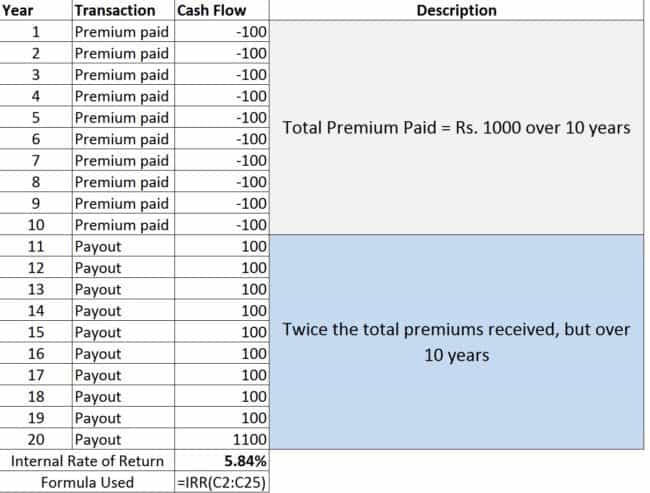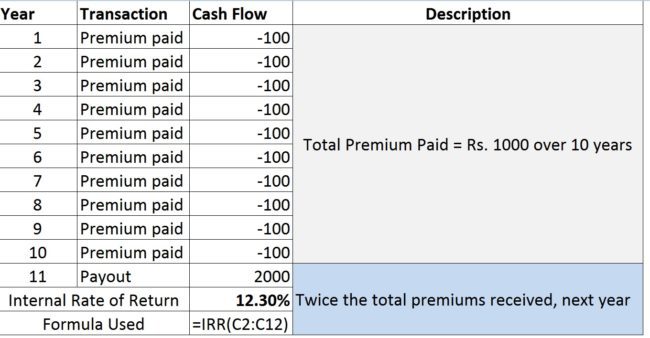Last Updated on December 19, 2021 at 7:18 pm
Benjamin Franklin wrote in 1748 that Time is Money in a note titled “Advice to a Young Tradesman”. This can be used in multiple ways and in this post, I use it to explain an important idea known as the Time Value of Money. Shall try to follow it up with other examples in future posts.
Journalist Yogita Khatri did an article for ET Wealth as to why traditional life insurance plans should be avoided (link below) that includes my inputs. I expand on some of the numbers provided to her.
Scenario 1: Guaranteed, but gradual payouts
Consider a typical “guaranteed income plan” offered by many insurers. This promises to pay a “regular income” for Y no of years after the premium is paid for X no of years. This sounds so great on paper. Let us investigate more with an example.
Say you need to pay a premium of Rs. 100 for 10 years. Then over the next 10 years, the insurer will pay you, double the total amount of total premiums paid. That is, you paid Rs. 100 x 10 = 1000 over ten years. It will pay you 2 x 1000 = 2000 over the next ten. Does it sound like a good deal?
Join 32,000+ readers and get free money management solutions delivered to your inbox! Subscribe to get posts via email! (Link takes you to our email sign-up form)
🔥Want to create a complete financial plan? Learn goal-based investing? Exclusive access to our DIY tools? Increase your income with your skills? Enjoy massive discounts on our robo-advisory tool & courses! 🔥
We ned to find out the internal rate of return (IRR or XIRR) to find out how good this is. IRR represents the annualised rate of return. Read more: CAGR vs. IRR: Understanding investment growth measures.
The premium paid is written as a -100 to represent cash leaving your hand. The payout is +100 to represent a receipt. So you can see the cash flow for 20 years below.
Notice that the payout is only Rs. 100 for nine years (from years 11 to 19). In year 20, the payout is Rs. 100 + Rs. 1000 = Rs. 1100. Making the total payout received twice the total premiums paid. Notice the IRR. It is a pathetic 5.84%. Many people fall into the lure of guaranteed income without understanding the idea of IRR and how to calculate it.
The formula one can use in Excel or Google Spreadsheet is indicated at the bottom.
Scenario 2: Guaranteed, but immediate payout
What if the insurer paid you twice the amount of premiums paid in the 11th year itself?
Well, if they did that, they will have to close down! Notice the huge difference in IRR. More than twice. This is the time value of money at work. When the payments are not immediate, you lose immensely and they gain immensely. And we are not even considering the fact that the insurer can invest the premiums collected and earn a return on it over the many years they hold on to it. Where do you think the bonuses come from?!!
If you receive the payout immediately, not only is the return high, you can use it any way you want. If they delay payouts, they can use it any way they want. Time is money!! This idea is also known as opportunity cost.
In context, it also means that liquidity matters! If the money is locked-in, we lose more than we know. In a sense, this proverb sums it up:
Link to Yogita Khatri’s ET Wealth Article: https://goo.gl/q7cF7p
Link to Benjamin Franklin’s essay: Advice to a Young Tradesman
🔥Enjoy massive discounts on our courses, robo-advisory tool and exclusive investor circle! 🔥& join our community of 7000+ users!
Use our Robo-advisory Tool for a start-to-finish financial plan! ⇐ More than 2,500 investors and advisors use this!
Track your mutual funds and stock investments with this Google Sheet!
We also publish monthly equity mutual funds, debt and hybrid mutual funds, index funds and ETF screeners and momentum, low-volatility stock screeners.





- Do you have a comment about the above article? Reach out to us on Twitter: @freefincal or @pattufreefincal
- Have a question? Subscribe to our newsletter using the form below.
- Hit 'reply' to any email from us! We do not offer personalized investment advice. We can write a detailed article without mentioning your name if you have a generic question.
Join 32,000+ readers and get free money management solutions delivered to your inbox! Subscribe to get posts via email! (Link takes you to our email sign-up form)
About The Author
 Dr M. Pattabiraman(PhD) is the founder, managing editor and primary author of freefincal. He is an associate professor at the Indian Institute of Technology, Madras. He has over ten years of experience publishing news analysis, research and financial product development. Connect with him via Twitter(X), Linkedin, or YouTube. Pattabiraman has co-authored three print books: (1) You can be rich too with goal-based investing (CNBC TV18) for DIY investors. (2) Gamechanger for young earners. (3) Chinchu Gets a Superpower! for kids. He has also written seven other free e-books on various money management topics. He is a patron and co-founder of “Fee-only India,” an organisation promoting unbiased, commission-free investment advice.
Dr M. Pattabiraman(PhD) is the founder, managing editor and primary author of freefincal. He is an associate professor at the Indian Institute of Technology, Madras. He has over ten years of experience publishing news analysis, research and financial product development. Connect with him via Twitter(X), Linkedin, or YouTube. Pattabiraman has co-authored three print books: (1) You can be rich too with goal-based investing (CNBC TV18) for DIY investors. (2) Gamechanger for young earners. (3) Chinchu Gets a Superpower! for kids. He has also written seven other free e-books on various money management topics. He is a patron and co-founder of “Fee-only India,” an organisation promoting unbiased, commission-free investment advice.Our flagship course! Learn to manage your portfolio like a pro to achieve your goals regardless of market conditions! ⇐ More than 3,000 investors and advisors are part of our exclusive community! Get clarity on how to plan for your goals and achieve the necessary corpus no matter the market condition is!! Watch the first lecture for free! One-time payment! No recurring fees! Life-long access to videos! Reduce fear, uncertainty and doubt while investing! Learn how to plan for your goals before and after retirement with confidence.
Our new course! Increase your income by getting people to pay for your skills! ⇐ More than 700 salaried employees, entrepreneurs and financial advisors are part of our exclusive community! Learn how to get people to pay for your skills! Whether you are a professional or small business owner who wants more clients via online visibility or a salaried person wanting a side income or passive income, we will show you how to achieve this by showcasing your skills and building a community that trusts and pays you! (watch 1st lecture for free). One-time payment! No recurring fees! Life-long access to videos!
Our new book for kids: “Chinchu Gets a Superpower!” is now available!


Must-read book even for adults! This is something that every parent should teach their kids right from their young age. The importance of money management and decision making based on their wants and needs. Very nicely written in simple terms. - Arun.Buy the book: Chinchu gets a superpower for your child!
How to profit from content writing: Our new ebook is for those interested in getting side income via content writing. It is available at a 50% discount for Rs. 500 only!
Do you want to check if the market is overvalued or undervalued? Use our market valuation tool (it will work with any index!), or get the Tactical Buy/Sell timing tool!
We publish monthly mutual fund screeners and momentum, low-volatility stock screeners.
About freefincal & its content policy. Freefincal is a News Media Organization dedicated to providing original analysis, reports, reviews and insights on mutual funds, stocks, investing, retirement and personal finance developments. We do so without conflict of interest and bias. Follow us on Google News. Freefincal serves more than three million readers a year (5 million page views) with articles based only on factual information and detailed analysis by its authors. All statements made will be verified with credible and knowledgeable sources before publication. Freefincal does not publish paid articles, promotions, PR, satire or opinions without data. All opinions will be inferences backed by verifiable, reproducible evidence/data. Contact information: To get in touch, use this contact form. (Sponsored posts or paid collaborations will not be entertained.)
Connect with us on social media
- Twitter @freefincal
- Subscribe to our YouTube Videos
- Posts feed via Feedburner.
Our publications
You Can Be Rich Too with Goal-Based Investing
 Published by CNBC TV18, this book is meant to help you ask the right questions and seek the correct answers, and since it comes with nine online calculators, you can also create custom solutions for your lifestyle! Get it now.
Published by CNBC TV18, this book is meant to help you ask the right questions and seek the correct answers, and since it comes with nine online calculators, you can also create custom solutions for your lifestyle! Get it now.Gamechanger: Forget Startups, Join Corporate & Still Live the Rich Life You Want
 This book is meant for young earners to get their basics right from day one! It will also help you travel to exotic places at a low cost! Get it or gift it to a young earner.
This book is meant for young earners to get their basics right from day one! It will also help you travel to exotic places at a low cost! Get it or gift it to a young earner.Your Ultimate Guide to Travel
 This is an in-depth dive into vacation planning, finding cheap flights, budget accommodation, what to do when travelling, and how travelling slowly is better financially and psychologically, with links to the web pages and hand-holding at every step. Get the pdf for Rs 300 (instant download)
This is an in-depth dive into vacation planning, finding cheap flights, budget accommodation, what to do when travelling, and how travelling slowly is better financially and psychologically, with links to the web pages and hand-holding at every step. Get the pdf for Rs 300 (instant download)
